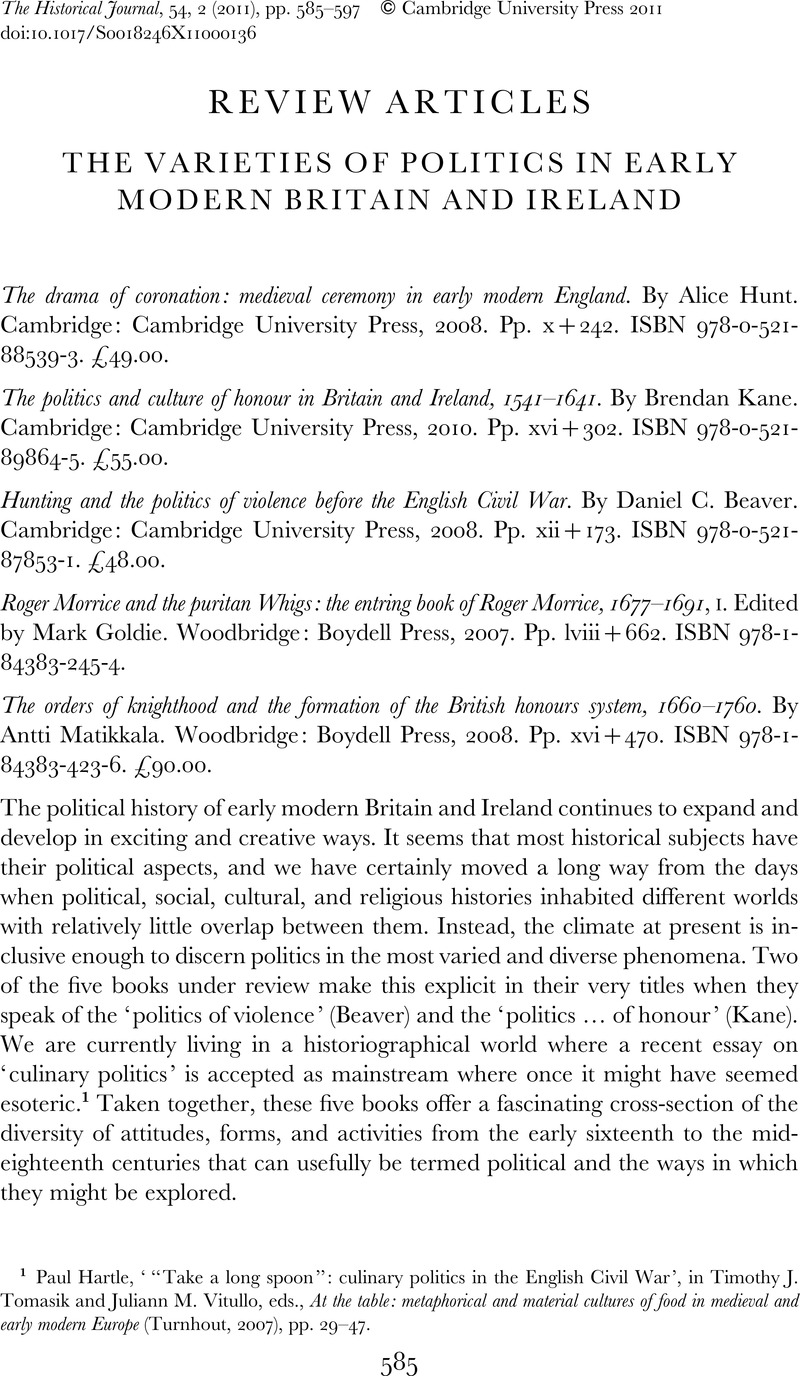No CrossRef data available.
Article contents
THE VARIETIES OF POLITICS IN EARLY MODERN BRITAIN AND IRELAND
Published online by Cambridge University Press: 11 May 2011
Abstract

- Type
- Review Articles
- Information
- Copyright
- Copyright © Cambridge University Press 2011
References
1 Paul Hartle, ‘ “Take a long spoon”: culinary politics in the English Civil War’, in Timothy J. Tomasik and Juliann M. Vitullo, eds., At the table: metaphorical and material cultures of food in medieval and early modern Europe (Turnhout, 2007), pp. 29–47.
2 Two other recent works that also offer convincing and stimulating discussions of this subject are J. P. D. Cooper, Propaganda and the Tudor state: political culture in the Westcountry (Oxford, 2003); and Kevin Sharpe, Selling the Tudor monarchy: authority and image in sixteenth-century England (New Haven, CT, and London, 2009).
3 Geertz, Clifford, ‘Thick description: towards an interpretive theory of culture’, in his The interpretation of cultures: selected essays (New York, NY, 1973), pp. 3–30.Google Scholar
4 On this theme, see especially Shaw, Dougal, ‘Nothing but propaganda? Historians and the study of early modern ritual’, Cultural and Social History: The Journal of the Social History Society, 1 (2004), 139–58CrossRefGoogle Scholar.
5 In exploring the culture and politics of honour, Kane acknowledges (pp. 4–6) his debt to Mervyn James's seminal article on ‘English politics and the concept of honour, 1485–1642’, reprinted in his Society, politics and culture: studies in early modern England (Cambridge, 1986), pp. 308–415. Another important work that analyses the politics of honour in early modern Ireland is Toby Barnard and Jane Fenlon, eds., The dukes of Ormonde, 1610–1745 (Woodbridge, 2000).
6 For other recent explorations of this theme, see especially John Adamson, The noble revolt: the overthrow of Charles I (London, 2007); Jane Ohlmeyer, ‘The baronial context of the Irish Civil Wars’, in John Adamson, ed., The English Civil War: conflict and contexts, 1640–1649 (Basingstoke, 2009), pp. 106–24; and Richard Cust, ‘William Dugdale and the honour politics of Stuart Warwickshire’, in Christopher Dyer and Catherine Richardson, eds., William Dugdale, historian, 1605–1686: his life, his writings and his country (Woodbridge, 2009), pp. 89–108.
7 Cf. E. P. Thompson, Whigs and hunters: the origin of the Black Act (London, 1975); and John Walter, Understanding popular violence in the English Revolution: the Colchester Plunderers (Cambridge, 1999).
8 On this episode, see especially Walter, John, ‘Grain riots and popular attitudes to the law: Maldon and the crisis of 1629’, reprinted in his Crowds and popular politics in early modern England (Manchester, 2006Google Scholar).
9 See, for example, the essays in Anthony Fletcher and John Stevenson, eds., Order and disorder in the English Revolution (Cambridge, 1985); Michael J. Braddick and John Walter, eds., Negotiating power in early modern society: order, hierarchy and subordination in Britain and Ireland (Cambridge, 2001); and the volume by John Walter cited in the previous note.
10 Hugh E. L. Collins, The Order of the Garter, 1348–1461: chivalry and politics in late medieval England (Oxford, 2000).
11 E. P. Thompson, The making of the English working class (London, 1963), p. 12.


